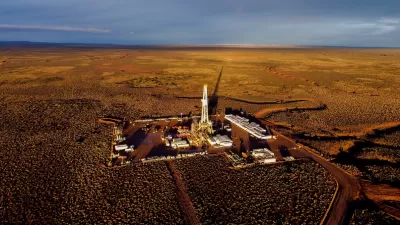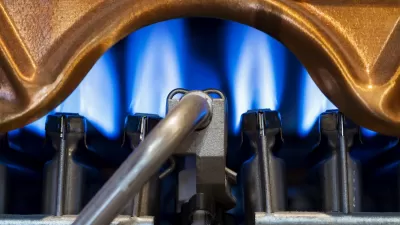Self-reported respiratory problems and skin irritations were significantly greater for those living near natural gas fracking wells in southwestern Pennsylvania than those living more than two kilometers away, according to a Yale University survey.
"People living near natural-gas wells were more than twice as likely to report upper-respiratory and skin problems than those farther away," writes Wendy Koch of USA TODAY on the study published Wednesday [Sept.10] in Environmental Health Perspectives.
"This is the largest study to look at the overall health of people living near the wells," says lead author and University of Washington environmental health professor Peter Rabinowitz, who did the research while at Yale. The study focused on Washington County, part of the Marcellus Shale where hydraulic fracturing, or fracking, is widely used to extract natural gas.
The findings don't "prove that the wells caused their symptoms, say Rabinowitz, adding more research is needed," notes Koch, adding that "(p)rior peer-reviewed studies have linked fracking to possible birth defects, higher lung disease risks, methane contamination in drinking water and elevated endocrine-disrupting chemical activity in groundwater."
However, according to a July report [PDF] by the American Petroleum Institute, "(t)here are zero confirmed cases of groundwater contamination connected to the fracturing operation in 1 million wells hydraulically fractured over the past 60 years," writes Koch.
That report notes that "(h)ydraulic fracturing has been used in the oil and natural gas industry since the 1940s." What's relatively recent is the application of horizontal drilling.
[Hat tip to Alex Guillén of Politico Morning Energy, Sept. 10 edition]
FULL STORY: People near 'fracking' wells report health woes

Planetizen Federal Action Tracker
A weekly monitor of how Trump’s orders and actions are impacting planners and planning in America.

Congressman Proposes Bill to Rename DC Metro “Trump Train”
The Make Autorail Great Again Act would withhold federal funding to the system until the Washington Metropolitan Area Transit Authority (WMATA), rebrands as the Washington Metropolitan Authority for Greater Access (WMAGA).

The Simple Legislative Tool Transforming Vacant Downtowns
In California, Michigan and Georgia, an easy win is bringing dollars — and delight — back to city centers.

The States Losing Rural Delivery Rooms at an Alarming Pace
In some states, as few as 9% of rural hospitals still deliver babies. As a result, rising pre-term births, no adequate pre-term care and harrowing close calls are a growing reality.

The Small South Asian Republic Going all in on EVs
Thanks to one simple policy change less than five years ago, 65% of new cars in this Himalayan country are now electric.

DC Backpedals on Bike Lane Protection, Swaps Barriers for Paint
Citing aesthetic concerns, the city is removing the concrete barriers and flexposts that once separated Arizona Avenue cyclists from motor vehicles.
Urban Design for Planners 1: Software Tools
This six-course series explores essential urban design concepts using open source software and equips planners with the tools they need to participate fully in the urban design process.
Planning for Universal Design
Learn the tools for implementing Universal Design in planning regulations.
Smith Gee Studio
City of Charlotte
City of Camden Redevelopment Agency
City of Astoria
Transportation Research & Education Center (TREC) at Portland State University
US High Speed Rail Association
City of Camden Redevelopment Agency
Municipality of Princeton (NJ)




























